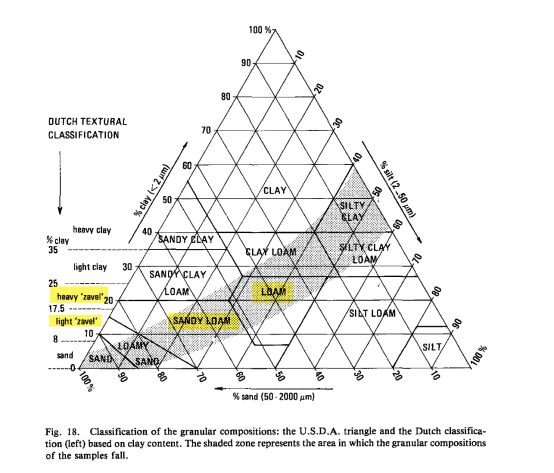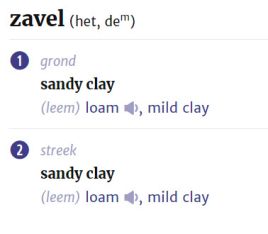No edit summary |
No edit summary |
||
| Line 116: | Line 116: | ||
<references /> | <references /> | ||
* https://en.wiktionary.org/wiki/zavel | * https://en.wiktionary.org/wiki/zavel | ||
* https://nl.wikipedia.org/wiki/Lutum | |||
* https://en.wikipedia.org/wiki/Lutite | |||
* https://de.wikipedia.org/wiki/Lutit | |||
* https://iate.europa.eu/search/result/1701281353597/1 (zware zavel vs lichte zavel) | |||
* https://iate.europa.eu/search/result/1701281353597/1 (lutum = lutite) | |||
* https://london-brussels.blogspot.com/2009/05/place-du-petit-sablon.html (The name “sablon” refers to the yellowish earth layer that could be seen along the shoulders of the dirt roads. This type of '''sandy clay''' '''was''' '''called "zavel" in Dutch''' and "sablon" in French. In the 14th century a small chapel in the sablon area was transformed into an important pilgrimage site where a miraculous statue of Our Lady was venerated.) | * https://london-brussels.blogspot.com/2009/05/place-du-petit-sablon.html (The name “sablon” refers to the yellowish earth layer that could be seen along the shoulders of the dirt roads. This type of '''sandy clay''' '''was''' '''called "zavel" in Dutch''' and "sablon" in French. In the 14th century a small chapel in the sablon area was transformed into an important pilgrimage site where a miraculous statue of Our Lady was venerated.) | ||
[[Category:Terms]] | [[Category:Terms]] | ||
{{Back to the top}} | {{Back to the top}} | ||
Revision as of 16:52, 1 December 2023
Dutch
- zavel[1]
English
- loam (Onroerend Goed Lexicon)
- sandy clay (Van Dale, Jansonius[2], Wolters[3])
- soil consisting mostly of sand with significant to high levels of clay (Wiktionary)
- coarse sand (GWIT)(incorrect)
- (chiefly Southern) sand (Wiktionary)
Soil Survey Papers, No. 14.
SOIL DEVELOPMENT IN RECENT MARINE SEDIMENTS OF THE INTERTIDAL ZONE IN THE OOSTERSCHELDE - THE NETHERLANDS. A SOIL MICROMORPHOLOGICAL APPROACH. Source: https://edepot.wur.nl/304736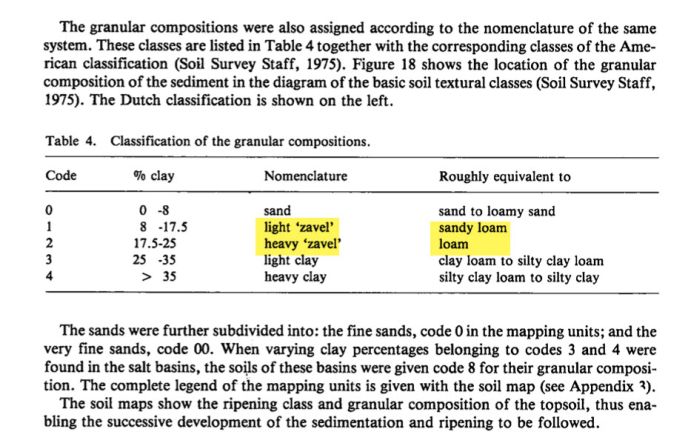
APPENDIX I Definition of terms
G. van der Veer (2006), Geochemical soil survey of the Netherlands, 214 NGS 347. Source: https://dspace.library.uu.nl/bitstream/1874/13275/24/app1.pdf
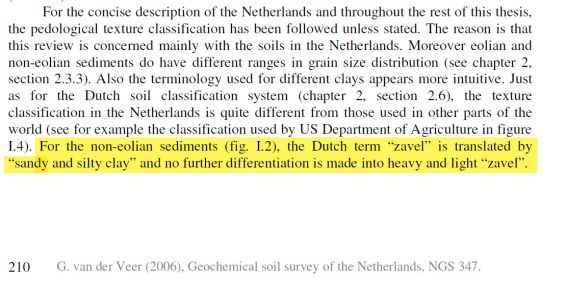
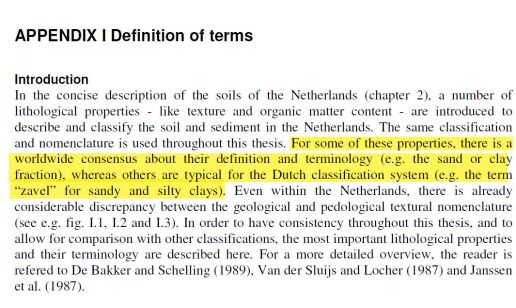
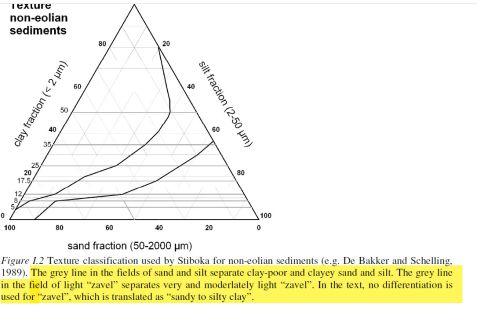
IATE
IATE: lichte zavel (aka: lemig zand, leemzand, lemige zandgrond, siltig zand, kleiig zand) def.: ‘grondsoort die bijna hoofdzakelijk uit zand bestaat, aangevuld met 0-30% silt en een verwaarloosbaar percentage lutum’ = loamy sand, loamy sand soil zware zavel (aka: zandige lichte klei) def.: ‘bodemsoort die voor ongeveer drie vierde uit zand en voor ongeveer een vierde uit lutum bestaat en nauwelijk silt bevat’ = sandy clay loam (https://iate.europa.eu/search/result/1701281353597/1) "De belangrijkste grondsoorten in Nederland zijn zand (48%), zavel (licht en zwaar, 22%), klei (licht en zwaar, 17%) en veen (9%) […] De voor landbouw meest geschikte gronden zijn goed ontwaterde lichte en zware zavelgronden. Deze leveren de hoogste opbrengsten en hebben de minste beperkingen. Daarna volgen de lichte kleigronden; ze zijn minder goed bewerkbaar dan de zavels door het hogere lutumgehalte (‘zwaarder’), en veelal is de draagkracht iets beperkter." ‘Grondsoort en grondprijs’ (https://iate.europa.eu/search/result/1701281353597/1)
Systeem van bodemclassificatie voor Nederland: de hogere niveaus
Most soils clearly belong to two different universa, and as a consequence there are two classification triangles, one for aeolean and one for the other sediments, with an overlap in the sand corner (Figs. 14 and 15, see also 'Bijlage' Ic).
Approximate translation of the terms:
Nomenclature of the aeolean classes:
• leemarm zand - loam-poor sand
• zwak lemig zand - slightly loamy sand
• sterk lemig zand - very loamy sand
• zeer sterk lemig zand - extremely loamy sand
• zandige leem - sandy loam
• siltige leem - silty loam
• kleiige leem - clayey loam
Nomenclature of the nonaeolean classes:
• kleiarm zand - clay-poor sand
• kleiig zand - clayey sand
• silt - silt
• zeer lichte zavel - very light 'zavel'
• matig lichte zavel - moderately light 'zavel'
• zware zavel - heavy 'zavel'
• lichte klei - light clay
• matig zware klei - moderately heavy clay
• zeer zware klei - very heavy clay
("Systeem van bodemclassificatie voor Nederland: de hogere niveaus", 1966)
Onroerend Goed Lexicon (Aart van den End)
• zavel = loam • lichte zavel = light loam • zware zavel = heavy loam • zavelgrond = loamy soil • lichte zavelgrond = light loamy soil
Oxforddictionaries.com
loam: 1. A fertile soil of clay and sand containing humus. 1.1 Geology A soil with roughly equal proportions of sand, silt, and clay. 1.2 A paste of clay and water with sand, chopped straw, etc., used in making bricks and plastering walls. silt: 1.2 technical Sediment whose particles are between clay and sand in size (typically 0.002–0.06 mm). lutite: A sediment consisting entirely of fine-clay particles (less than 0.002 mm in diameter) i.e. argillaceous. lutum (= in Dutch/Latin): verzamelnaam; landbouw gronddeeltjes met afmetingen kleiner dan 0,002 mm
Van Dale
References
- ↑ Ensie.nl: https://www.ensie.nl/betekenis/zavel
- ↑ Jansonius, H. -- (Nieuw) Groot Nederlands-Engels woordenboek voor studie en practijk
- ↑ Wolters’ Handwoordenboek Nederland-Engels (20e druk, 1994)
- https://en.wiktionary.org/wiki/zavel
- https://nl.wikipedia.org/wiki/Lutum
- https://en.wikipedia.org/wiki/Lutite
- https://de.wikipedia.org/wiki/Lutit
- https://iate.europa.eu/search/result/1701281353597/1 (zware zavel vs lichte zavel)
- https://iate.europa.eu/search/result/1701281353597/1 (lutum = lutite)
- https://london-brussels.blogspot.com/2009/05/place-du-petit-sablon.html (The name “sablon” refers to the yellowish earth layer that could be seen along the shoulders of the dirt roads. This type of sandy clay was called "zavel" in Dutch and "sablon" in French. In the 14th century a small chapel in the sablon area was transformed into an important pilgrimage site where a miraculous statue of Our Lady was venerated.)
